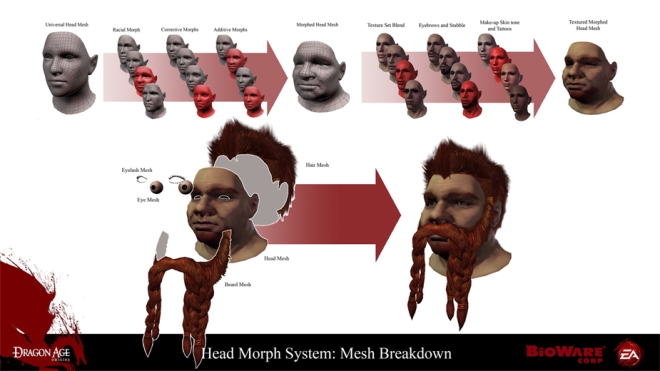Notes on Dragon Age: Origins #4 — I was annoyed that my character didn’t speak, but it opened up the space to build my own performance
I totally, totally understand why Dragon Age: Origins doesn’t have voice acting for the player character, although I’ll admit that after playing the Mass Effect trilogy and selecting a voice during the character creation process, I was in the moment surprised when Neria (that’s my character’s name — I just used the default name for an elven mage) didn’t voice some version of the first selection I made from the dialogue choices.
I get it. It’s a matter of basic economics. Resources aren’t limitless, and given the amount of variation and customizability in player character creation, it’s severely impractical to bring in actors and record every possible version of everything the player character can say.
I’m working hard to not talk about Mass Effect in this series, but the depth of Jennifer Hale’s and Mark Meer’s performances as Commander Shepard demands consideration as an oppositional design choice between BioWare’s two major franchises.
There’s not really enough consideration given to video game play as performance, in part, I think, because the heavy emphasis on scripting in many contemporary story games. When we talk about games as “cinematic” experiences, we’re often talking about primary storylines presented in large part as cutscenes that play between levels or interactive events. Frequently, the only contingency at operation is whether the player will complete the play challenge in order to reach the next segment of the story rather than offering the player significant influence over the content or delivery of that story. Nathan Drake does what he does, the player just pulls the trigger.
This, of course, is also due to limitations in resources.
Even in BioWare’s games, which do offer significant narrative branching, the player is more often able to direct how the player character performs an action rather than between two (or more) different actions. In Arl Eamon’s dungeons, I could kill Jowan or not kill him, but there were a half dozen things I could say to him while killing or not killing him. Whether Jowan is alive or dead impacts the choices available when I discover that the Arl’s son has been possessed by a demon, but in the moment, I tend to be more concerned with what Neria would (and does) say than with killing/not killing as a binary choice.
That is, I’m more concerned with creating and sustaining a character than with navigating a particular story tree.
Or at least I try to be. I spent a lot of time in Mass Effect making sure particular outcomes remained available. I try not to think of it as cheating.
But in Mass Effect, Shepard was more of a shared performance than Neria is. Jennifer Hale was Shepard, and I directed her performance in my own version of the narrative. So I was much more focused on my role in getting Shepard to where she was supposed to be. For my Shepard to be my Shepard, she had to find a way to make the Quarians and the Geth work together. It didn’t matter as much whether that meant diplomacy or shouting. (It mattered, but if a renegade interrupt helped get me there, I wasn’t going to let my paragon preferences entirely get in the way.)
If, on the other hand, I keep talking about the way Dragon Age seems open to improvisation, a lot of that is due to the fact that I get to enact Neria a bit more as a performance of my own. There isn’t necessarily much difference in being able to push the overarching story in different directions, but there’s a greater variety in the shading of how I can do it.
Largely because what I do doesn’t have to fit within an actor’s performance of my player character. I do miss Jennifer Hale, and it is still a bit weird that everyone talks but Neria, but if Dragon Age really were just a medieval Mass Effect, I wouldn’t keep playing it.
Originally published 3/23/15 on Medium
